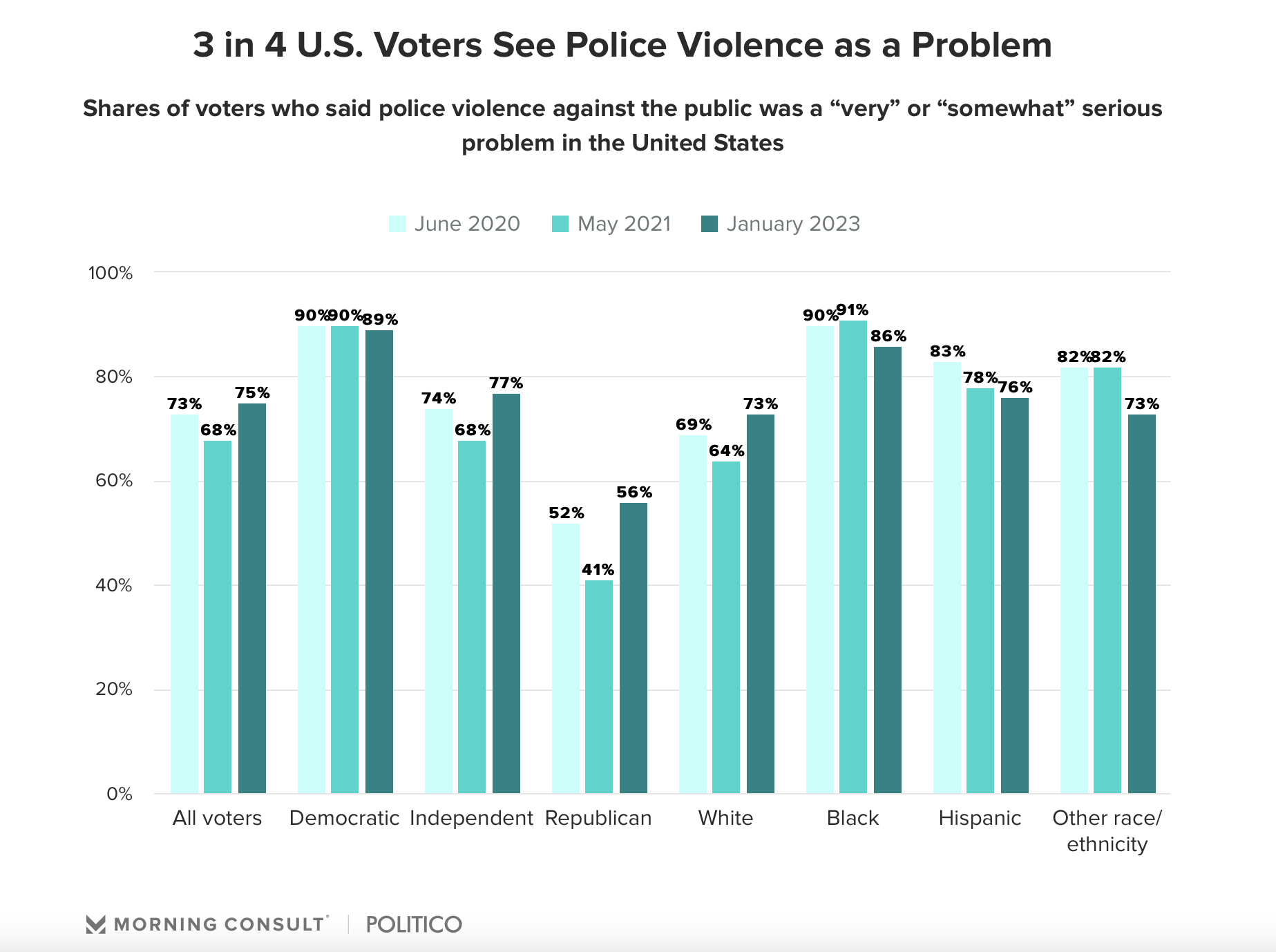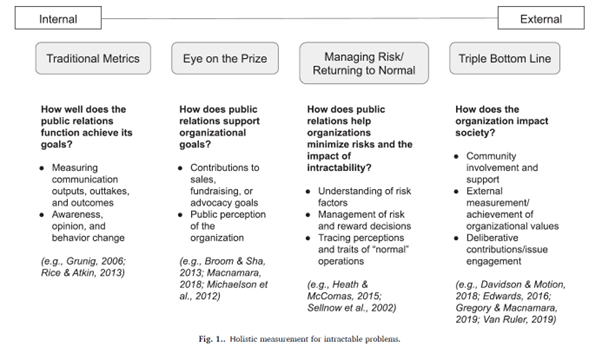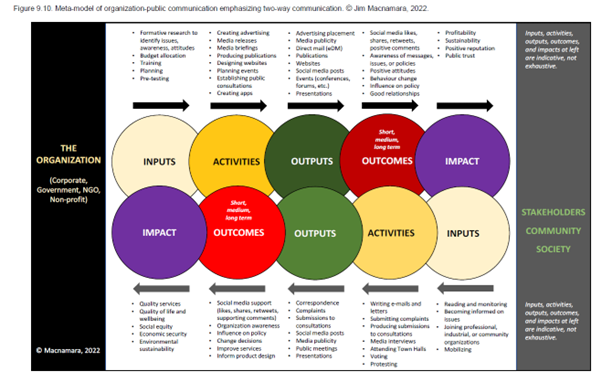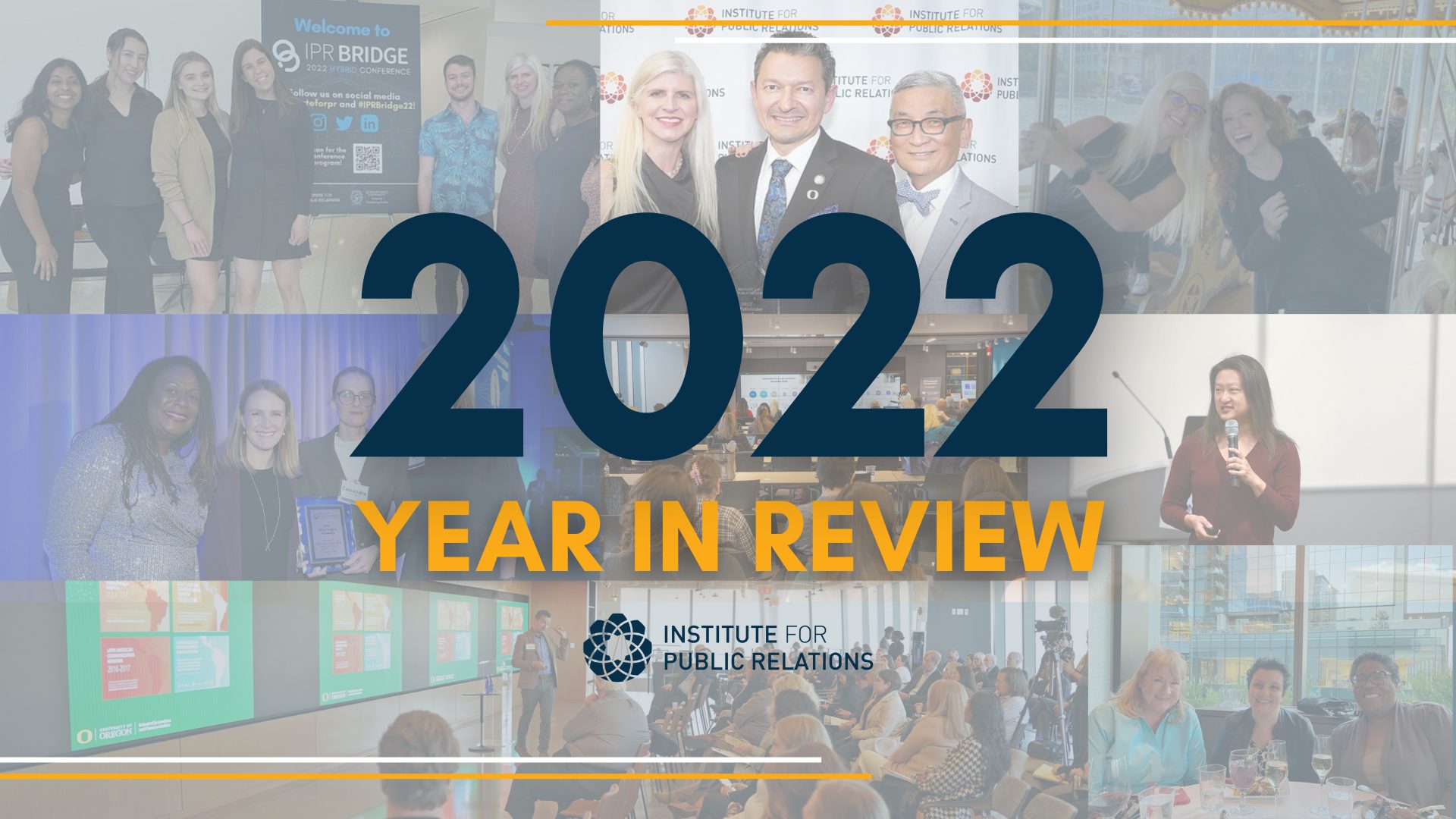This blog is provided by the IPR Measurement Commission based on the original blog published by PR AcademyIn the preface of his latest and final book in the Using Data Better trilogy, Sam Knowles admits that he ‘wrote the books in the wrong order’. He states the ‘unsynchronous chronology’ of starting with data storytelling in Narrative By Numbers (NbN, 2018), then exploring the paths to true data-driven insights in How To Be Insightful (HTBI, 2020[1]), before getting to the principle at the heart of it all: Asking Smarter Questions (ASQ, published last month and dated 2023).What matters much more than the order, however, are the recurring themes that thread together the three books to a trilogy about powerful purposeful organisational storytelling: about asking the right questions to get to the right insights that help tell the right stories.A disclaimer: as Sam is a friend, a former colleague, and with Neville Hobson my co-presenter at the SmallDataForum podcast, I’m likely to be more familiar with his thinking (not least thinking about thinking), than most readers of this review. Hopefully, you’ll trust me that that’s a good thing, and has not clouded my judgement.A classicist (more Greco than Roman in his own view) and behavioural psychologist with decades in the ‘moving business’[2], Sam’s interests and curiosity are wide-ranging and eclectic. In ASQ, he discusses the psychoanalyst Melanie Klein’s ‘epistemophilic instinct’ – a constant search for knowledge and desire to connect dots – and throughout all three of his books, we get the perspectives of fellow epistemophiliacs from a wide range of fields. These voices – from Nobel Prize-winning science to policing to Zen Buddhism – provide strong proof points for the core argument: that smarter questions stimulate more useful answers. The summaries at the end of each interview section provide an equally diverse, and concordant set of top tips.ASQ is a very personal book, as were its two predecessors in the Using Data Better trilogy. Sam’s style of thinking about thinking always links personal and professional experience and reflection to arrive at genuine human insights. If you’re in the ‘moving business’, that’s what you should always strive for.What, then, are the key ingredients to Using Data Better? ASQ revisits the ‘golden rules of storytelling’ outlined in NbN:Keep it simpleFind and use relevant dataAvoid false positives (…and spurious correlations…)Beware the curse of knowledgeKnow your audienceTalk humanIt also recalls the four stages of getting to insights – “profound and useful understandings of people, issues, topics or things”, the STEP Prism of Insight of HTBI:Sweat (the hard graft to get the data)Timeout (creating the time and space for – sometimes unexpected – connections to form)Eureka (that precious moment when it suddenly clicks)Proof (the essential final step where gut feelings are validated, and why questions answered with evidence)This all comes together in six universal principles for asking smarter questions:Curiosity (the epistemophilic instinct of wanting to know more, of always asking ‘why?’)Open-mindedness (embrace your inner Socrates and start from the knowledge of knowing nothing)Preparation (always ask ‘what’s going on here’)[3]Openness (don’t prescribe an answer; open questions usually generate more interesting responses)Simplicity (in Sam’s words, “like shorter letters, simpler questions take longer to craft”)Listening (listen to hear and understand, not to speak)ASQ is not an airport bookshop-style $5.99 quick-read. Its 280 pages are packed with stories from Sam’s and his interviewees’ journeys through academia and practice, learning and application. Many if not all paths lead back to ancient Athens, to Socrates and Aristotle, to the Stoics. To the principles of classical storytelling through the three stages of thesis, antithesis and finally, synthesis. To the art of rhetoric, combining feeling or emotion (pathos), reason or logic (logos) and character or nature (ethos) of the communicator to generate impact, to influence and persuade.And those are just the foundations. A deep interest in, and understanding of both psychology, and data as evidence adds to this comprehensive account of how the right questions can lead to the right insights that help tell the right stories to address our manifold wicked problems.[4]In addition to Greek philosophy, modern psychology, and data-driven storytelling, another thread running through ASQ, and indeed the entire Using Data Better trilogy, is education (especially Western educational systems): what we teach, how we teach, and what it means. This is a topic Sam is particularly passionate and critical about as he sees “curiosity and creativity stunted by education”.He praises Simon Sinek for his childlike embrace of the why question[5], which infants ask upwards of 40,000 times in the years before they start school – at which point the focus switches to giving answers instead of asking questions. Thus Sam pleads with Roger Waters (‘Hey! Teacher! Leave them kids alone!’) and educationalist cum TED celebrity Sir Ken Robinson for the nurture of curiosity and creativity. In doing so, he argues for a new curriculum of at least two mastered languages (mother tongue plus one), applied mathematics (in particular applied to finance, statistics and data storytelling, creative expression, coding, logic, sports for physical and mental wellbeing, meditation and mindfulness, and critical faculty and judgement.The two he highlights, not least from the perspective of ‘moving storytelling’, are creative expression and critical faculty and judgement.There is a lot to learn in ASQ, an account abundant with relevant observations and insights for all of us in the ‘moving business’ (whether as practitioners, or educators, or both). My personal favourite, which I will encourage colleagues, client and students to embrace: “When someone presents you with a set of data or a data-rich presentation, become a four-year-old again.”Do that, and inevitably you will be using data better.[1] Reviewed by Richard Bailey for PR Place Insights and subsequently picked as the Editor’s Choice for PR Academy’s Book of the Year 2020[2] A phrase coined by the US business writer Dan Pink in To Sell is Human, referring to hearts and minds rather than furniture. Pink features throughout the trilogy.[3] In a recent conversation, leading scholar of the measurement and evaluation of communication, Professor Jim Macnamara, described this to me as ‘frontloading the research’: giving more weight to the formative, planning phase of research. See also Organizational Listening in Public Communication: Emerging Theory and Practice (Macnamara 2022).[4] For a comprehensive overview of our most pressing, complex global (=wicked) problems, explore The Wicked 7 website.[5] Sinek’s Start With Why TED Talk from 2009 is the third most watched of all time. At no. 1, also referenced in Ask Smarter Questions, is Sir Ken Robinson’s How Schools Kill Creativity.
 Thomas Stoeckle is Partner of Analytics and Insights at Dot I/O Health, Part-time Lecturer at Bournemouth University, Course Leader at PR Academy, and Visiting Lecturer at Quadriga University. He is also a member of the IPR Measurement Commission.
...
Thomas Stoeckle is Partner of Analytics and Insights at Dot I/O Health, Part-time Lecturer at Bournemouth University, Course Leader at PR Academy, and Visiting Lecturer at Quadriga University. He is also a member of the IPR Measurement Commission.
...
Read More...

 This summary is provided by the IPR Digital Media Research CenterPew Research Center examined Americans’ use of alternative social media sites — BitChute, Gab, Gettr, Parler, Rumble, Telegram, and Truth Social — and the type of content on the sites.A multi-method research approach was used, including a survey of 10,188 U.S. adults on May 16-22, 2022 and content analyses of over 500,000 posts on the sites in June 2022.Key findings include:— 6% of respondents said they “regularly get news” from at least one of the seven sites studied.— 65% of alternative social media news consumers said they “have found a community” of people that share their views.— 26% of prominent alternative social media accounts appeal to right-leaning/Trump supporting views.— 21% appeal to patriotism/pro-America views.— 21% appeal to religious identity views.— Most of the alternative social media sites in the study moderate their content to some extent.— Six of the seven sites studied have moderated content.— Two of the seven sites studied have group or channel administrators that can moderate content.Learn how Americans use alternative social media sites
...
This summary is provided by the IPR Digital Media Research CenterPew Research Center examined Americans’ use of alternative social media sites — BitChute, Gab, Gettr, Parler, Rumble, Telegram, and Truth Social — and the type of content on the sites.A multi-method research approach was used, including a survey of 10,188 U.S. adults on May 16-22, 2022 and content analyses of over 500,000 posts on the sites in June 2022.Key findings include:— 6% of respondents said they “regularly get news” from at least one of the seven sites studied.— 65% of alternative social media news consumers said they “have found a community” of people that share their views.— 26% of prominent alternative social media accounts appeal to right-leaning/Trump supporting views.— 21% appeal to patriotism/pro-America views.— 21% appeal to religious identity views.— Most of the alternative social media sites in the study moderate their content to some extent.— Six of the seven sites studied have moderated content.— Two of the seven sites studied have group or channel administrators that can moderate content.Learn how Americans use alternative social media sites
... 

 This summary is provided by the IPR ESG & Purpose Research Library.Deloitte examined how ethical principles are currently being applied to emerging technology.A survey of 1,794 business and technical professionals actively involved in either developing, managing, or consuming emerging technologies was conducted.Key findings include:1.) 87% of respondents said that, with the exception of cognitive technologies (e.g., AI), their company does not have or is unsure if they do have specific ethical principles governing emerging technology.2.) Even for companies that have broad ethical principles for emerging technology, only 47% of respondents said their company updates those principles at least annually.3.) 79% of respondents said that their company’s ethical standards were shared by their leadership, while far fewer said they were shared by mid-level managers (11%) and individual employees (5%).4.) 89% of respondents said they buy into executive messaging on ethics, though the numbers differ by generation.— 93% of Baby Boomers— 90% of Generation X— 85% of Millennials5.) When new principles emerge, companies should try to understand why and appropriately incorporate or at least acknowledge these changes to show that they are listening.Find the original report here.
...
This summary is provided by the IPR ESG & Purpose Research Library.Deloitte examined how ethical principles are currently being applied to emerging technology.A survey of 1,794 business and technical professionals actively involved in either developing, managing, or consuming emerging technologies was conducted.Key findings include:1.) 87% of respondents said that, with the exception of cognitive technologies (e.g., AI), their company does not have or is unsure if they do have specific ethical principles governing emerging technology.2.) Even for companies that have broad ethical principles for emerging technology, only 47% of respondents said their company updates those principles at least annually.3.) 79% of respondents said that their company’s ethical standards were shared by their leadership, while far fewer said they were shared by mid-level managers (11%) and individual employees (5%).4.) 89% of respondents said they buy into executive messaging on ethics, though the numbers differ by generation.— 93% of Baby Boomers— 90% of Generation X— 85% of Millennials5.) When new principles emerge, companies should try to understand why and appropriately incorporate or at least acknowledge these changes to show that they are listening.Find the original report here.
... 
 Thomas Stoeckle is Partner of Analytics and Insights at Dot I/O Health, Part-time Lecturer at Bournemouth University, Course Leader at PR Academy, and Visiting Lecturer at Quadriga University. He is also a member of the IPR Measurement Commission.
...
Thomas Stoeckle is Partner of Analytics and Insights at Dot I/O Health, Part-time Lecturer at Bournemouth University, Course Leader at PR Academy, and Visiting Lecturer at Quadriga University. He is also a member of the IPR Measurement Commission.
... 
 Jim Macnamara, for many years a thought and practice leader when it comes to the evolution and improvement of the measurement and evaluation of public communication (advocating organisational listening as the fundamental skill), provides a similar perspective in his recent work, which among others is based on large-scale project commissioned by the World Health Organisation post pandemic (Macnamara, 2023). He applies an ‘architecture of listening’ that sees organisational communication as a two-way process: from the organisation to stakeholders, communities, society at large, through a logical progression from inputs to activities, to outputs, outcomes and ultimately, impact. And then the reverse, from the environment to the organisation, through the same logical steps:
Jim Macnamara, for many years a thought and practice leader when it comes to the evolution and improvement of the measurement and evaluation of public communication (advocating organisational listening as the fundamental skill), provides a similar perspective in his recent work, which among others is based on large-scale project commissioned by the World Health Organisation post pandemic (Macnamara, 2023). He applies an ‘architecture of listening’ that sees organisational communication as a two-way process: from the organisation to stakeholders, communities, society at large, through a logical progression from inputs to activities, to outputs, outcomes and ultimately, impact. And then the reverse, from the environment to the organisation, through the same logical steps:
 In: Macnamara, J., 2022. Organizational Listening in Public Communication: Emerging theory and practice. Sydney: University of Technology Sydney, p. 65.Both Capizzo and Macnamara recognise the work of AMEC, especially the Integrated Evaluation Framework, as foundational as they “fit neatly within the quantitative, metrics-driven management frameworks favored by organizational leaders and professional communication associations” (Capizzo, 2022, p. 1). But when organisations and communicators are facing wicked VUCA challenges, previously neat fits might no longer suffice. As Sam Knowles would put it (for example in his new book, which I’ve reviewed for PR Academy), the time has come to ask smarter questions to get to better answers.For the last two years, I have been leading the AMEC International Certificate in Measurement and Evaluation at PR Academy, and the centrepiece of this course are AMEC’s freely available planning tools, from the Measurement Maturity Mapper questionnaire to assess an organisations ‘M&E maturity’, to the Planning Sheet and ultimately, the Integrated Evaluation Framework to plan, execute and evaluate communication activities.These are excellent, practically useful tools, grounded in reflective practice as well as academic theory and research evidence (enshrined in the Barcelona Principles). The more practitioners are familiar with them and apply them in their day-to-day work, the more our field will develop and improve. In particular in light of the aforementioned wicked VUCA challenges, I encourage students as well as clients to use those tools and make them work for their specific contexts and challenges. Modified and advanced frameworks with additional metrics, grounded in curious exploration through asking smarter questions and getting to more relevant insights – all this will help us navigate our ‘interesting times’.Further reading:Capizzo, L. (2022). What counts amid contention? Measuring perceived intractable problems in public relations. Public Relations Review, 48(2), 1-11. https://doi.org/https://doi.org/10.1016/j.pubrev.2022.102179Macnamara, J. (2023). Measurement, evaluation + learning (MEL): New approaches for insights, outcomes, and impact. In D. Pompper, K. R. Place, & C. K. Weaver (Eds.), The Routledge Companion to Public Relations (pp. 225-236). Routledge.
In: Macnamara, J., 2022. Organizational Listening in Public Communication: Emerging theory and practice. Sydney: University of Technology Sydney, p. 65.Both Capizzo and Macnamara recognise the work of AMEC, especially the Integrated Evaluation Framework, as foundational as they “fit neatly within the quantitative, metrics-driven management frameworks favored by organizational leaders and professional communication associations” (Capizzo, 2022, p. 1). But when organisations and communicators are facing wicked VUCA challenges, previously neat fits might no longer suffice. As Sam Knowles would put it (for example in his new book, which I’ve reviewed for PR Academy), the time has come to ask smarter questions to get to better answers.For the last two years, I have been leading the AMEC International Certificate in Measurement and Evaluation at PR Academy, and the centrepiece of this course are AMEC’s freely available planning tools, from the Measurement Maturity Mapper questionnaire to assess an organisations ‘M&E maturity’, to the Planning Sheet and ultimately, the Integrated Evaluation Framework to plan, execute and evaluate communication activities.These are excellent, practically useful tools, grounded in reflective practice as well as academic theory and research evidence (enshrined in the Barcelona Principles). The more practitioners are familiar with them and apply them in their day-to-day work, the more our field will develop and improve. In particular in light of the aforementioned wicked VUCA challenges, I encourage students as well as clients to use those tools and make them work for their specific contexts and challenges. Modified and advanced frameworks with additional metrics, grounded in curious exploration through asking smarter questions and getting to more relevant insights – all this will help us navigate our ‘interesting times’.Further reading:Capizzo, L. (2022). What counts amid contention? Measuring perceived intractable problems in public relations. Public Relations Review, 48(2), 1-11. https://doi.org/https://doi.org/10.1016/j.pubrev.2022.102179Macnamara, J. (2023). Measurement, evaluation + learning (MEL): New approaches for insights, outcomes, and impact. In D. Pompper, K. R. Place, & C. K. Weaver (Eds.), The Routledge Companion to Public Relations (pp. 225-236). Routledge.




 This summary is provided by the IPR Organizational Communication Research Center.Dr. Cen April Yue examined how employees’ perceptions of organizations’ use of bridging and buffering public relations strategies affected their positive responses to organizational change. Bridging strategies are relationship-focused and speak to an organization’s sincerity in narrowing the gaps between the positions of the organization and its stakeholders. Buffering strategies concern using strategic messaging to control public perception, with the goal of protecting an organization from criticism.A survey of 439 full-time employees working across various industries in the United States was conducted in August 2018. A literature review was also conducted.Key findings include:1.) The more employees perceived the use of bridging strategies by their organizations, the more they believed that change had positive implications for themselves and their organizations, thus engaging in change-supportive behaviors.— This finding was consistent with prior literature showing the value of bridging strategies in reducing misunderstandings, resolving discrepancies, and creating mutually beneficial solutions between an organization and its various stakeholder groups.2.) A positive relationship was found between employees’ openness to change and three forms of behavioral support: employee compliance, cooperation, & championing.3.) A positive relationship was found between perceived organizational use of bridging strategies and employees’ openness to change.Find the original report here.
...
This summary is provided by the IPR Organizational Communication Research Center.Dr. Cen April Yue examined how employees’ perceptions of organizations’ use of bridging and buffering public relations strategies affected their positive responses to organizational change. Bridging strategies are relationship-focused and speak to an organization’s sincerity in narrowing the gaps between the positions of the organization and its stakeholders. Buffering strategies concern using strategic messaging to control public perception, with the goal of protecting an organization from criticism.A survey of 439 full-time employees working across various industries in the United States was conducted in August 2018. A literature review was also conducted.Key findings include:1.) The more employees perceived the use of bridging strategies by their organizations, the more they believed that change had positive implications for themselves and their organizations, thus engaging in change-supportive behaviors.— This finding was consistent with prior literature showing the value of bridging strategies in reducing misunderstandings, resolving discrepancies, and creating mutually beneficial solutions between an organization and its various stakeholder groups.2.) A positive relationship was found between employees’ openness to change and three forms of behavioral support: employee compliance, cooperation, & championing.3.) A positive relationship was found between perceived organizational use of bridging strategies and employees’ openness to change.Find the original report here.
... 
 Korn Ferry examined the role investor relations officers (IROs) play in helping organizations navigate unpredictable and dynamic markets.A survey of 397 members of the National Investor Relations Institute (NIRI) was conducted from April – May 2022.Key findings include:1.) IROs said the most important skills needed to be successful today are:— Communication/storytelling— Financial acumen— Strategic mindset— Managing ambiguity2.) More than 80% of IROs changed how they managed the IR function during the pandemic.— 64% of IROs said the IR function has been elevated within their company.3.) With a virtual lockdown, more IROs have leveraged technology and digital communication to conduct roadshows, one-on-one meetings, and conferences, as well as fine-tune their materials to better suit the virtual meeting landscape.4.) More than 90% of IROs said they are “very optimistic” or “somewhat optimistic” about the profession.Find the original report here.
...
Korn Ferry examined the role investor relations officers (IROs) play in helping organizations navigate unpredictable and dynamic markets.A survey of 397 members of the National Investor Relations Institute (NIRI) was conducted from April – May 2022.Key findings include:1.) IROs said the most important skills needed to be successful today are:— Communication/storytelling— Financial acumen— Strategic mindset— Managing ambiguity2.) More than 80% of IROs changed how they managed the IR function during the pandemic.— 64% of IROs said the IR function has been elevated within their company.3.) With a virtual lockdown, more IROs have leveraged technology and digital communication to conduct roadshows, one-on-one meetings, and conferences, as well as fine-tune their materials to better suit the virtual meeting landscape.4.) More than 90% of IROs said they are “very optimistic” or “somewhat optimistic” about the profession.Find the original report here.
...